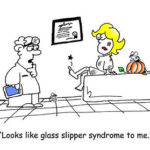It’s often said that the anxiety sufferer is his own worst enemy and in a sense that’s true. If you’ve ever just listened to what the voice in your head is saying to you, without you even realizing, you’d be pretty amazed.
This really hit home to me a couple of weeks ago after yet another trip to my therapist. She asked me to go through an exercise to help me tune into what my brain was telling itself every time I get an anxiety symptom. For me my anxiety centers on my heart. I’m always paranoid I have a heart condition or that I’m about to have a heart attack or something equally absurd. The ‘evidence’ for this generally consists of chest pains (sharp, tight, crushing, skipped beats, tingling – you name it!), palpitations and giddiness. But I’d never really stopped and considered how my mind reacts when I have such a sensation and when I did it was quite a shock.
I can’t say with any certainty but I’m pretty sure that when so called ‘normal’ people have a chest spasm they don’t immediately say: “oh, I’m going to die’. They probably just pass it off as a heavy dinner. In fact a friend’s dad was so far this way inclined he actually tried to cure a genuine heart attack with a Rennie’s Indigestion tablet! (He lived to tell the tale you’ll be pleased to hear). Me on the other hand – and I’m pretty sure this goes for you as well – have an entirely different reaction. “I’m going to die” or “this could be a heart attack” are common favorites. As such the body responds to this and you have the makings of a vicious cycle. Before you know it the pains come more regularly. Maybe they spread to the stomach as well. Maybe you notice an odd rhythm in your heart. And all the while you’re feeding this by further telling yourself you’re going to die.
So, what can you do? Well, I guess the first thing you do is break the cycle. If you’re anything like me then you’ve been to the doctor’s a hundred times and every time he’s told you you’re the picture of health. So how’s about we start believing him? Every time you get a little flutter dismiss that voice that tells you you’re dying. Replace it with something like this: “I know I’m okay, this is just an anxiety symptom. It’s harmless, it won’t hurt you.”
Yep, I know what you’re thinking. This seems too easy to be true. And you’re right, I have made it seem simple. In reality it is hard work to reprogram your mind. You’ve spent days, weeks, months – even years – telling yourself you’re going to die and for a while you’re brain might not believe you. But stick with it, I promise you, within a few days you will start to notice a change.
If you want to find out more about how to accept anxiety symptoms for what they are then I recommend ‘Self – Help for Your Nerves’ by Dr Claire Weeks.





Great advice!
https://www.thehypochondriac.com/phpBB2/viewtopic.php?f=5&t=1666
I liked this ^ a lot. It is frustrating to succumb to fear with two minds, one saying “You know this is only anxiety!” and the other; “But I think this is really it!”
It helps me sometimes to have someone get a little harsh with me. In fact, I have had someone get too harsh and piss me off in the middle of a panic attack. The panic attack went away, and I found my “certain death” symptoms did as well. 🙂
Comforting to know there are others who also wage the same battle in their mind. Not letting the symptom kick your anxiety level up is difficult when it seems to happen automatically!
Seana – thanks. That looks liek a great website. I will give it a proper look over the next few days.
And you’re right, Chuck. There is certainly strength in numbers. And there are plenty of us out there!
I wanted to comment on something Chuck said.
You’re correct in saying that the anxiety strikes you almost automatically at first.
But it’s what happens after that that keeps people continuously nervous and sick. The moment you have an anxious thought or fear pop up, you need to face the fear and accept it for exactly what it is. A nervous/fearful thought. Then do your best to relax while you experience the adrenaline that goes with that first strike of fear. The problem for most people is that they follow that first momentary fear, with a second fearful thought pattern which just throws gasoline on the fire, thus making them feel worse.
Dr Claire Weekes wrote a book called “Hope and Help for your Nerves”, and she explains the entire process in masterful detail, and how to break that cycle. It’s available on Amazon.com for $8. I highly recommend it.
I’m 55 and have been having a heart attack for more than a decade. Lol. Fortunately I’ve learned to combat the negative thoughts that accompany anxiety with healthy ones and the realization that it’s all in my mind. Recently I was just reminded of how insidious anxiety is when a knee sprain short-circuited a full-blown panic attack complete with heart palpitations, arm and chest pain. The body can only register one pain at a time (try biting your lip the next time you stub your toe) and I guess the real pain of my knee trumped the mirage of my heart problem. Fighting anxiety is a perpetual battle that requires healthy eating, exercise (which when done right is a daily reminder that your heart is strong), solid sleep and laughter.
I’m 55 and have been having a heart attack for the past decade. Lol. Fortunately, I have learned that these incidents are the result of anxiety, which tricks our minds in such an insidious way that it can be difficult to manage. In fact, I was reminded recently that while the effects of anxiety may feel real and frightening, the event is most often a mirage. I was playing tennis and strained my knee resulting in intermittent sharp pains for a week. In the days following as I was nursing the injury, I felt little or no physical symptoms of anxiety. I read once that the body can’t feel two pains at the same time (try biting your lip the next time you stub your toe) and I guess my knee injury trumped the pseudo heart problem … again. The moral of my story — and the one maybe you need to adopt — is that fighting anxiety is a perpetual battle of eating right, getting solid sleep, exercising (which when done correctly will remind you daily that your heart is strong), and laughing.